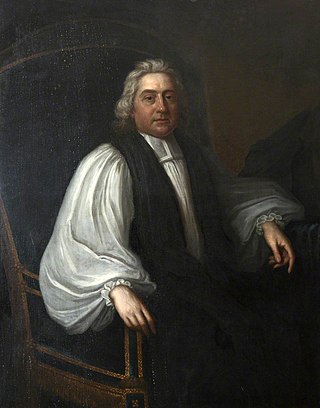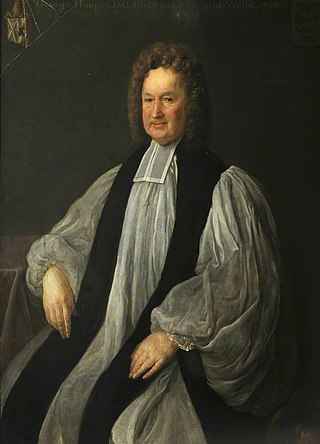Related Research Articles

White Kennett was an English bishop and antiquarian. He was educated at Westminster School and at St Edmund Hall, Oxford, where, while an undergraduate, he published several translations of Latin works, including Erasmus' In Praise of Folly.

Ofspring Blackall, Bishop of Exeter and religious controversialist, was born in London.

Francis Turner D.D. was Bishop of Ely, one of the seven bishops who petitioned against the Declaration of Indulgence and one of the nine bishops who refused to take the oath of allegiance to William III.

George Hooper was a learned and influential English High church cleric of the late seventeenth and early eighteenth centuries. He served as bishop of the Welsh diocese, St Asaph, and later for the diocese of Bath and Wells, as well as chaplain to members of the royal family.
Adam Martindale (1623–1686) was a British presbyterian minister, closely involved in the evolution of presbyterianism in Lancashire in the seventeenth century.
Obadiah Grew was an English nonconformist minister.

William Bates (1625–1699) was an English Presbyterian minister.

John Kettlewell was an English clergyman, nonjuror and devotional writer. He is now known for his arguments against William Sherlock, who had justified the change of monarch of 1688–89 and his own switch of sides in The Case of the Allegiance. According to J. P. Kenyon, Kettlewell's reply made a case "with which conformist Anglicans could only agree, because it was spiritual, while Sherlock's was resolutely aspiritual". He went on to attack defenders of the Glorious Revolution generally as proponents of fallacious contractarian theories.
John Shower (1657–1715) was a prominent English nonconformist minister.

Lewis Atterbury the younger LL.D., (1656–1731) was an English churchman, a royal chaplain to two monarchs.
Robert Robinson D.D., was an eccentric Dissenting Minister, and has been accused of being controversial and belligerent.
Henry Grove was an English nonconformist minister, theologian, and dissenting tutor.
John Bryan, D.D., was an English clergyman, an ejected minister of 1662.

William Tong (1662–1727) was an English Presbyterian minister, at the heart of the subscription debate of 1718.

Matthew Mead or Meade was an English Independent minister.
Simon Ford (1619?–1699), was an English divine.
Charles Le Cène (1647?–1703) was a French Huguenot controversialist, in exile in England and the Netherlands after 1685.
James Durham was the eldest son of John Durham of Easter Powrie, north of Dundee. He was educated at University of St Andrews, and betook himself to the life of a country gentleman. While visiting his mother-in-law in the parish of Abercorn, he came under profound religious impressions in consequence of a sermon by Melvill, minister of Queensferry. Joining in the Civil War, he was promoted captain, and seriously exhorted and led the devotions of his company; this being noticed by Professor Dickson, he was induced to prepare himself for the ministry, a resolution which was hastened by two narrow escapes on the battlefield. He graduated M.A.. He was licensed for the ministry by the Presbytery of Irvine 18 May 1647. He was admitted to the congregation of Blackfriars 2 December 1647. Durham was appointed chaplain to the King July 1650. He called 4 September 1651, with charge of West Quarter of the city. He endeavoured, without success, to effect a union between the two contending parties in the Church in 1652. He died of consumption, 25 June 1658.
Thomas Lye, or Lee, or Leigh, was an English Nonconformist minister.

Timothy Cruso (1657–1697) was an English Presbyterian minister and writer. He studied in the Newington Green Academy; proceeded M.A. at one of the Scotch universities; was pastor at Crutched Friars in 1688; was appointed to the Pinners Hall merchants' lectureship in 1694; and died at an early age in 1697—just eight years before Defoe wrote Robinson Crusoe and immortalised his name. Cruso also published homilies and sermons.
References
![]() This article incorporates text from a publication now in the public domain : "Bryan, Matthew". Dictionary of National Biography . London: Smith, Elder & Co. 1885–1900.
This article incorporates text from a publication now in the public domain : "Bryan, Matthew". Dictionary of National Biography . London: Smith, Elder & Co. 1885–1900.